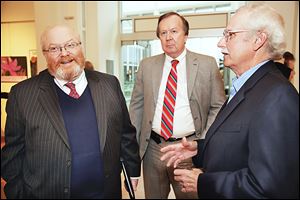
Authors! Authors! series
Expert: Lincoln grew in strength, morals as president
4/19/2013
U.S. presidential historian Richard Norton Smith, left, talks with Clyde Scoles and Tom Culbertson during the Authors! Authors! event at the Main Library.
Abraham Lincoln may have been the most gifted politician to occupy the White House for many reasons, not the least of which may be that Americans of varying ages, backgrounds, and political persuasions still love learning about him.
“History is nothing if not connections,” and the perspective that comes from connecting then and now, Richard Norton Smith told a crowd of 275 Thursday night in the McMaster Center of the Main Library. A presidential historian, Mr. Smith made a convincing case for why Lincoln deserves the top spot at the Authors! Authors! series sponsored by The Blade and the Toledo-Lucas County Public Library.
“In a strange way, the worse things got, the stronger he got,” a highly desirable trait during crisis, said Mr. Smith, 59. “There were enormous reserves of strength of character. There was a thirst for immortality. And there’s no doubt Lincoln grew in his spiritual tendencies,” although he never joined a church and remained suspicious of creeds. “I think he believed in the existence of God and found solace in that.”
Lincoln had his father’s ability to spin tales, which could madden Cabinet members who’d heard them too often but reflected his ability to communicate with the public. So did his habit to spend two days a week listening to citizens who lined up outside the White House.
He was an astute observer and relied on humor, using the balm of the ridiculous — never in short supply in Washington — to maintain sanity, a gift his high-strung wife and political partner, Mary Todd Lincoln, didn’t avail herself of. He used his sharp tongue to impale many competitors and critics, but disarmed others and masked his ambitions by laughing at himself. He announced his and Mary’s arrival (she at less than 5 feet tall, he at 6 feet, 4 inches, size 14 shoes and a floating eye) as “here’s the long and short of it.” When he returned from Gettysburg with a light case of smallpox, he said, “at last I have something I can give everyone.”
How Lincoln, with scant education, penned such great speeches might be traced to his having read the King James Version of the Bible, Aesop’s Fables, and even geometry late at night.
Mr. Smith of Arlington, Va., directed presidential libraries and museums dedicated to Lincoln, Hoover, Eisenhower, Reagan, and Ford and has written biographies on Herbert Hoover, George Washington, Thomas E. Dewey, and co-authored a book with Bob and Elizabeth Dole. He’s completing a biography on Nelson Rockefeller, then expects to undertake one on Gerald Ford.
Born into a racist culture, Lincoln never stopped growing, “above all, morally.” Three days before he was killed, he delivered a speech endorsing black Americans’ right to vote.
If Lincoln taught us anything, Mr. Smith said, it’s that leaders who uphold timeless principles — his great work, of course, was getting Congress to pass the 13th Amendment outlawing slavery — will usually find time on their side.
The next speaker in the Authors! Authors! series will be Anna Quindlen, Pulitzer Prize-winning novelist/essayist, at 7 p.m. May 8, in the Stranahan Theater.
Contact Tahree Lane at tlane@theblade.com or 419-724-6075